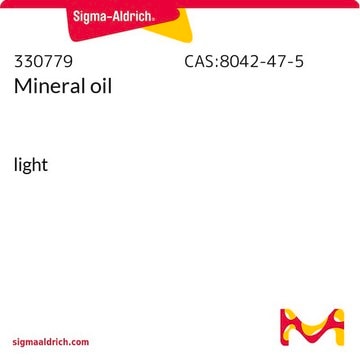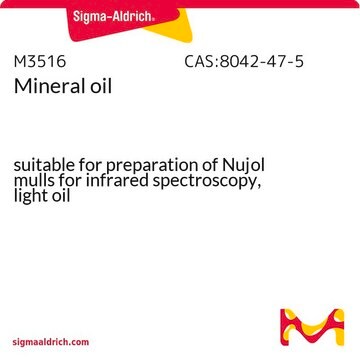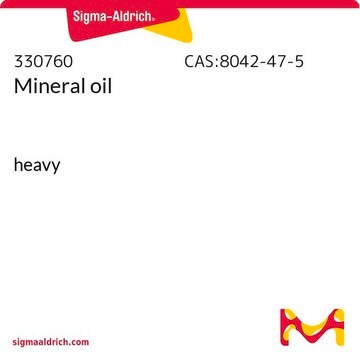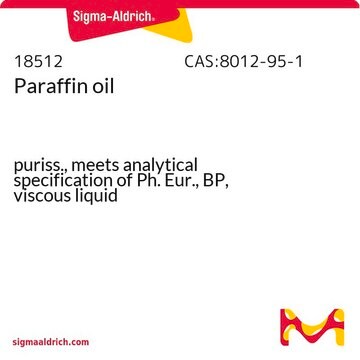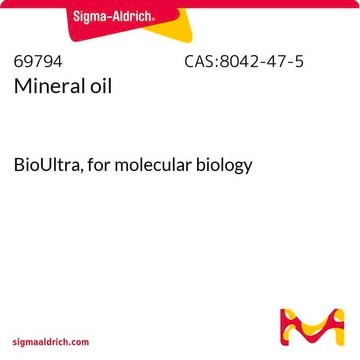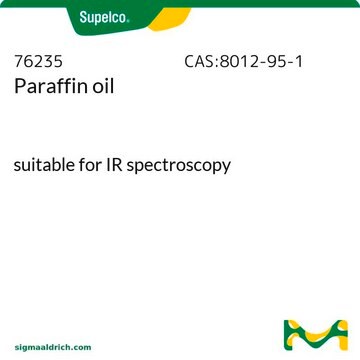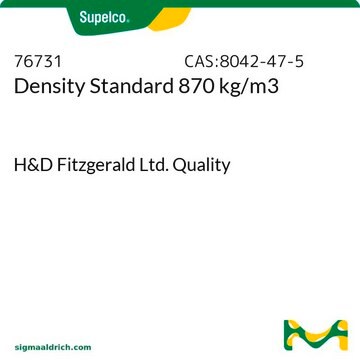M5904
Mineral oil
BioReagent, for molecular biology, light oil
Synonym(s):
light mineral oil
Sign Into View Organizational & Contract Pricing
All Photos(1)
About This Item
grade:
for molecular biology
technique(s):
PCR: suitable
Recommended Products
grade
for molecular biology
Quality Level
product line
BioReagent
form
light oil
technique(s)
PCR: suitable
color
colorless
refractive index
n20/D 1.467 (lit.)
density
0.84 g/mL at 25 °C (lit.)
suitability
suitable for overlaying aqueous reactions and centrifuge gradients
foreign activity
DNase, RNase, Protease, none detected
storage temp.
room temp
InChI key
AEOVEGJBKQQFOP-DDVLFWKVSA-L
Looking for similar products? Visit Product Comparison Guide
General description
Mineral oils are usually seen as a mixture of liquid hydrocarbons. It is derived from crude oil by distillation and refining.
Application
Mineral oil has been used:
- to suspend the gels for capillary contraction assay
- in polymerase chain reaction (PCR) reactions mixture to form a vapor barrier in order to prevent the evaporation of the reaction at elevated temperatures
- as a continuous phase to prevent droplet coalescence in emulsification system
Mineral oil is suitable for use as an overlay to control evaporation and cross contamination of samples in a variety of molecular biology applications.
Biochem/physiol Actions
Mineral oil delivers a better insulation strength, when compared to air. It enhances the elimination of heat from the windings, when used in a power transformer.
Storage Class Code
10 - Combustible liquids
WGK
WGK 1
Flash Point(F)
No data available
Flash Point(C)
No data available
Personal Protective Equipment
dust mask type N95 (US), Eyeshields, Gloves
Choose from one of the most recent versions:
Already Own This Product?
Find documentation for the products that you have recently purchased in the Document Library.
Customers Also Viewed
Microfluidic flow-focusing in ac electric fields
Tan SH, et al.
Lab on a chip, 14(6), 1099-1106 (2014)
A quantitative analysis of contractility in active cytoskeletal protein networks
Bendix PM, et al.
Biophysical Journal, 94(8), 3126-3136 (2008)
Process Fluids for Abrasive Machining
Tribology of Abrasive Machining Processes, 531-585 (2004)
S Nathakarnkitkool et al.
Electrophoresis, 13(1-2), 18-31 (1992-01-01)
Capillary electrophoretic separations of double-stranded DNA fragments in the size range of 20-2200 base pairs were achieved in less than 20 min with the use of a Tris-borate buffer containing hydroxyethylcellulose. Analyses were carried out in both uncoated and phenylmethyl-coated
Electrical distribution and installation
Plant Engineer's Reference Book (2002)
Our team of scientists has experience in all areas of research including Life Science, Material Science, Chemical Synthesis, Chromatography, Analytical and many others.
Contact Technical Service
